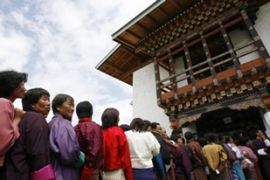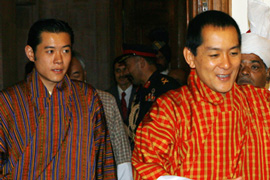Bhutan holds practice election
Mock parties contest the vote ahead of a planned democratic transition.

Bhutan‘s transition contrasts with the nearby kingdom of Nepal, where King Gyanendra made an ill-fated attempt to take dictatorial powers and now risks his monarchy being dismantled.
As recently as the 1960s, Bhutan had no roads and practically no schools or hospitals. Today education and healthcare are free, and life expectancy has risen to 66 years, from less than 40, a fact most people attribute to the monarch’s rule.
Democracy fears
 |
| Bhutan’s former king, right, handed power to his Oxford-educated son, left, last year [AFP] |
But, with conflicts in Bangladesh, Nepal and India, many Bhutanese worry democracy may lead to corruption and strife.
Gopilal Acharya, 28, editor of the Bhutan Times, a private newspaper launched last year as part of moves towards a free press, said: “We live in a very unstable region.
“In some of our neighbours democracy has not really worked, so people are a bit sceptical whether it will work in Bhutan.”
Four mock parties are contesting the vote and have been given imaginary platforms stressing fairness and accountability, the environment, industrial development and traditional values.
A 2006 study by a British scientist ranked Bhutan the eighth happiest country in the world, just behind Sweden, despite its having an average national income of $740.
Nepali refugees
But human rights group have criticised the country for abuses, including its deportation of tens of thousands of ethnic Nepalis, mostly Hindus, from south Bhutan after they protested against discrimination – and for democracy – in 1990.
Bhutan says most were illegal immigrants. But the refugees, now living in camps in Nepal, say they had lived in Bhutan for generations and are victims of ethnic cleansing.
An ex-soldier of Nepali origin, refusing to give his name, said: “Those who fought for democracy have been driven away. If the Bhutanese government really wanted to give democracy, those people should be allowed to come back and vote.”
As for real political parties, only two have been formed, disappointing those who had hoped for real debate ahead of next year’s elections. One, likely to be led by Wangchuck’s brother-in-law, Sangay Ngedup, is strongly tipped to take power.